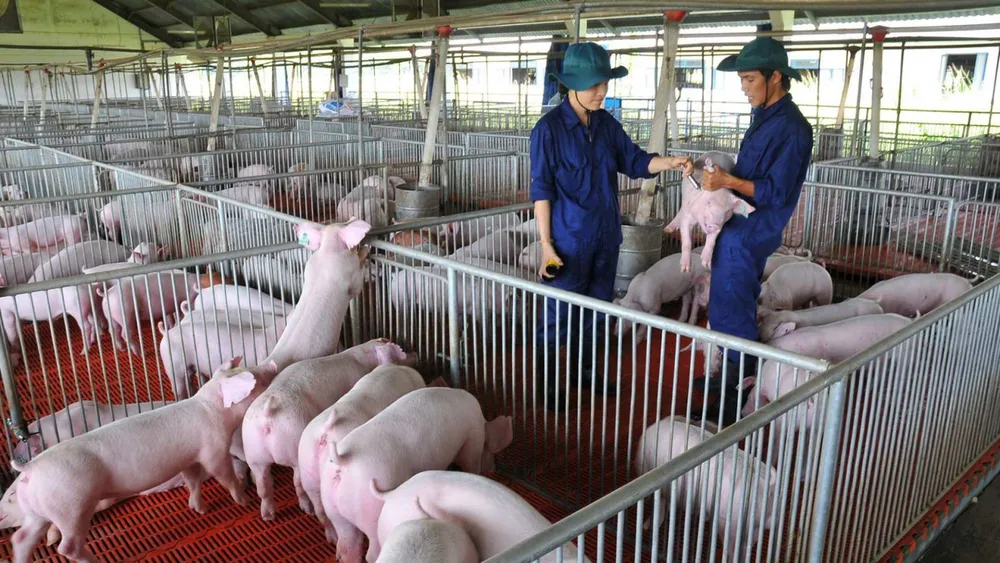With demand for meat increasing at the end of the year, restoring livestock farming and implementing supportive government policies have become more urgent than ever.
Shortages and damages
In Bac Ninh Province, Nguyen Chi Hai’s pig farm, located in Gia Binh Town, Gia Binh District, near the mudflat area of the Duong River, has suffered significant damage from the recent flooding. The farm, leased by Dabaco Group for pig farming, had to mobilize heavy machinery to relocate over 5,000 pigs to safety urgently as floodwaters rose.
Meanwhile, in Yen Bai Province, the pig farm of Hoa Binh Minh Company in Tuy Loc Commune, Yen Bai City, was severely impacted by the floods. According to Ms. Pham Thi Phuong Vinh, Director of Hoa Binh Minh Company, the farm had a capacity of 5,000 pigs, but only 50 survived after the floods. Over 4,800 pigs were either swept away by the floodwaters or found dead in the inundated areas, resulting in losses of up to VND40 billion for the business.
Preliminary statistics from the Department of Agriculture and Rural Development in Bac Giang Province indicate that approximately 170,000 poultry and livestock were affected during the recent heavy rains and floods. Many farms in various localities were submerged, leading to significant losses for farmers.
The Department of Animal Husbandry and Veterinary of Yen Bai Province reported that the floods have resulted in the deaths of over 7,000 livestock and nearly 350,000 poultry. Mr. Dam Duy Duc, the department head, noted that the extensive rainfall and flooding had devastated many farming households, leading to the loss of their livestock and the destruction of their facilities, putting farmers at significant risk of losing their livelihoods.
Live pork prices rise
On September 26, live pork prices in the Central Highlands and Central regions were reported to increase by VND2,000 compared to the beginning of the week, ranging from VND66,000 to VND70,000 per kilogram. In the Southern region, live pig prices were between VND64,000 and VND67,000 per kilogram.
Mr. Nguyen Kim Doan, Vice Chairman of the Dong Nai Livestock Association, noted that the decrease in pork supply is also attributed to the ongoing complexities of African swine fever. Forecasts from livestock associations and traders indicate that pork prices could reach VND80,000 per kilogram in the near future.
The reasons for the price increase are not only due to supply shortages but also because domestic piglet prices are rising. According to the Department of Livestock Husbandry, from now until the end of the year, including the 2025 Lunar New Year holiday, demand for pork is expected to rise by about 10 percent to 15 percent compared to normal levels, while localities are set to ensure a stable supply of domestically produced pork.
The Ministry of Agriculture and Rural Development (MARD) has recommended that 16 major pig farming companies nationwide expand their production capacity to secure supply. Additionally, smallholder farmers must ensure that any new or increased herds come from safe, disease-free, high-quality breeding stock while strictly adhering to biosecurity measures to maintain herd health.
The Ministry forecasts that pig supplies will increase in the near future. However, due to the ongoing complexities of disease outbreaks, live hog prices may remain high and are not expected to decrease until 2025.
Accelerating production recovery
Mr. Nguyen Van Long, Director of the Department of Animal Health under the MARD, has warned about the heightened risk of disease outbreaks at the end of the year, particularly following the recent floods. The Department has instructed an increased use of disinfectants and vaccines to decontaminate and sanitize livestock farming environments.

According to Mr. Le Quoc Thanh, Director of the National Agricultural Extension Center, the most critical step after the floods is to address environmental issues through decontamination and sanitation using both biological and chemical methods.
Meanwhile, Dr. Nguyen Xuan Duong, Chairman of the Vietnam Livestock Association, reported that companies face significant debt risks due to considerable asset losses. Support from the Government and the community is vital to help businesses quickly restore production.
To facilitate recovery, companies and farmers must repair facilities, restock breeding stock, and disinfect both farms and surrounding environments. Therefore, in addition to considering debt restructuring or deferrals, banks should also contemplate offering loans to businesses at favorable interest rates when needed.
Localities in Northern Vietnam are swiftly working to restore livestock production, particularly pig farming, as the weather stabilizes. The Department of Agriculture and Rural Development in Bac Giang Province has been collaborating with relevant agencies to implement disease prevention measures and restore livestock facilities.
The Department of Agriculture and Rural Development in Yen Bai Province has announced that farms affected by the floods will receive assistance under Government Decree No.02/2017/ND-CP, which provides support for agricultural production in disaster-stricken areas. The department has also been researching specific local support policies to present to the provincial People's Committee for approval, aiming to help residents quickly restore production and repopulate herds, ensuring a stable food supply for the market in the coming time.
To ensure sufficient food supply during the upcoming Tet holiday, maintain exports, and stabilize prices, the MARD has issued multiple directives, organized meetings, and dispatched inspection teams to localities to facilitate the recovery of livestock and aquaculture while supporting those affected by natural disasters.
Localities are urgently carrying out comprehensive sanitation, disinfection, and sterilization efforts following the floods to eliminate pathogens in the environment. They are closely monitoring livestock and promptly detecting any signs of disease, swiftly addressing any suspected cases. Farmers must immediately report any signs of illness in their animals to the authorities and are prohibited from slaughtering, selling, or disposing of deceased animals in the environment.
Livestock, aquaculture sectors ensure supply
Deputy Minister of Agriculture and Rural Development Phung Duc Tien reported that the recent floods caused significant damage to the livestock sector, resulting in nearly 26,500 livestock deaths, primarily pigs, along with over 3 million poultry fatalities.
Many farms were inundated, leading to the deaths of thousands of pigs, while others had to sell off their animals due to damaged facilities. Typhoon Yagi and the subsequent heavy rains also inflicted substantial losses on the aquaculture sector, with more than 3,700 fish cages swept away. Initial estimates suggest that the aquaculture sector suffered losses of approximately VND2.5 trillion, while the livestock sector faced losses of around VND2 trillion.
Despite the significant damage, the support policies outlined in Decree No.02/2017/ND-CP are no longer suitable. MARD has proposed that the government issue a specialized resolution to aid production recovery following Typhoon Yagi and is currently drafting amendments to Decree No.02. MARD has also suggested that the government consider postponing or relieving debts for businesses, cooperatives, and livestock farmers. Additionally, efforts will continue to address issues related to insurance and reinsurance to promote sustainable development in the aquaculture and livestock sectors.
Regarding food supply for the last four months of the year, particularly for the Lunar New Year market, Deputy Minister Phung Duc Tien stated that MARD has directed businesses and associations to assist farmers in quickly restoring production by providing livestock, materials, and feed to meet food demand. The goal is to minimize the impact on the consumer price index, maintain exports, and ensure growth in the agricultural sector.
In some scenarios, there may be a need to accelerate the production of short-term livestock products to support long-term ones and timely meet food supply. Specifically, poultry farming will be emphasized, as industrial chickens require just over one month to three months to reach market weight, and ducks and geese approximately 45-50 days.
Therefore, the agricultural sector is capable of fully recovering with various production cycles leading up to the Lunar New Year. Deputy Minister Phung Duc Tien highlighted that the livestock and aquaculture sectors will soon be restored to ensure adequate supply for the domestic market and support exports.
























